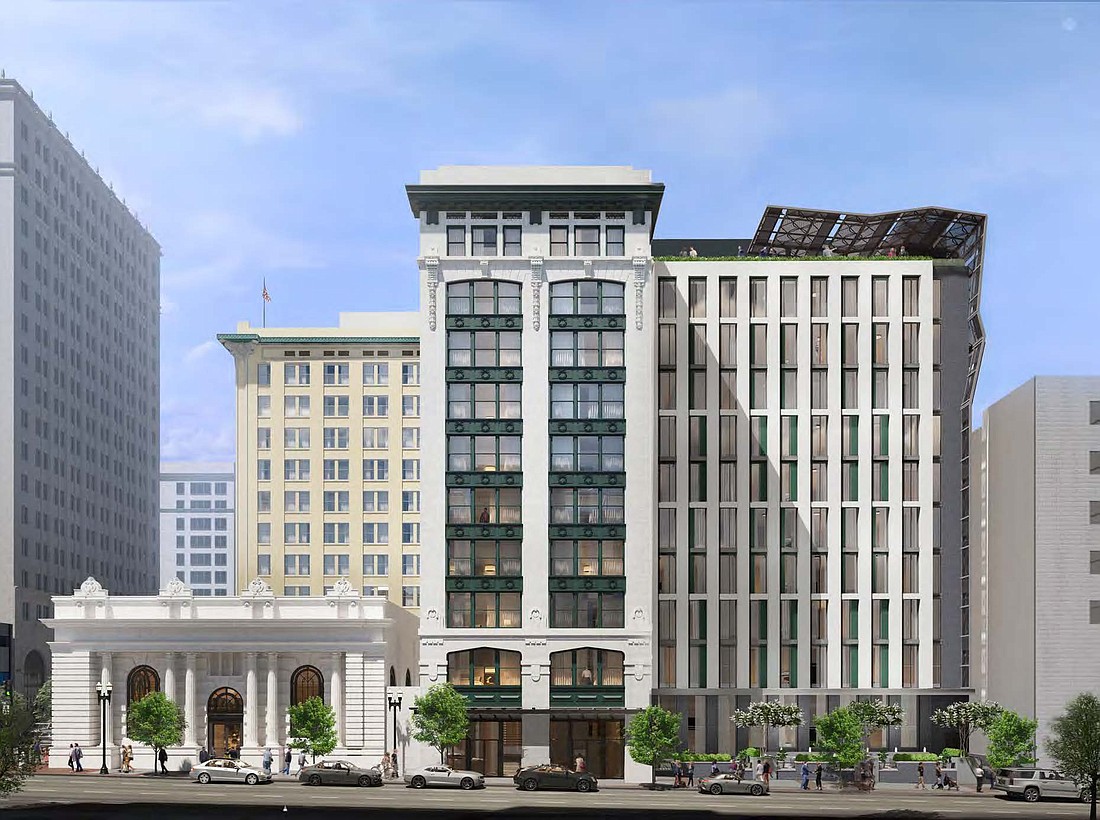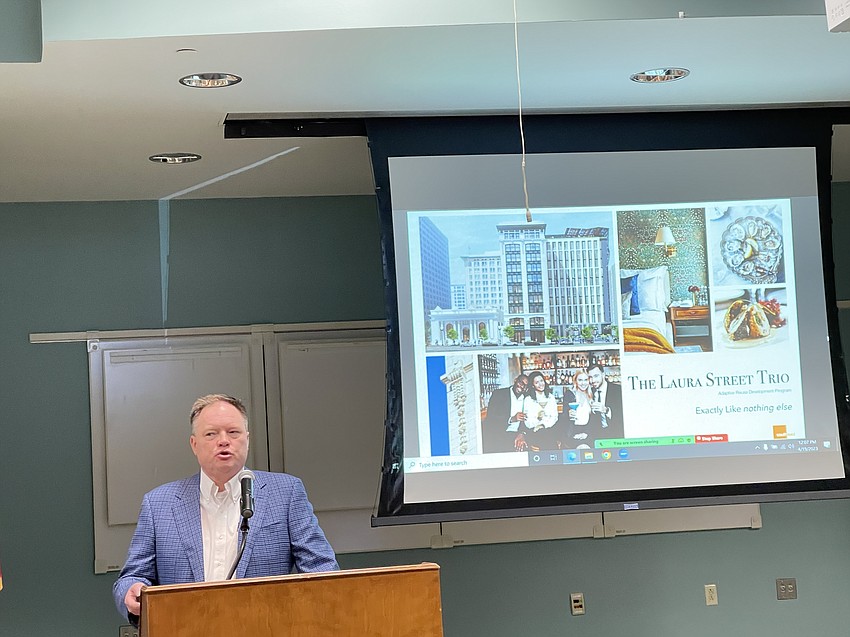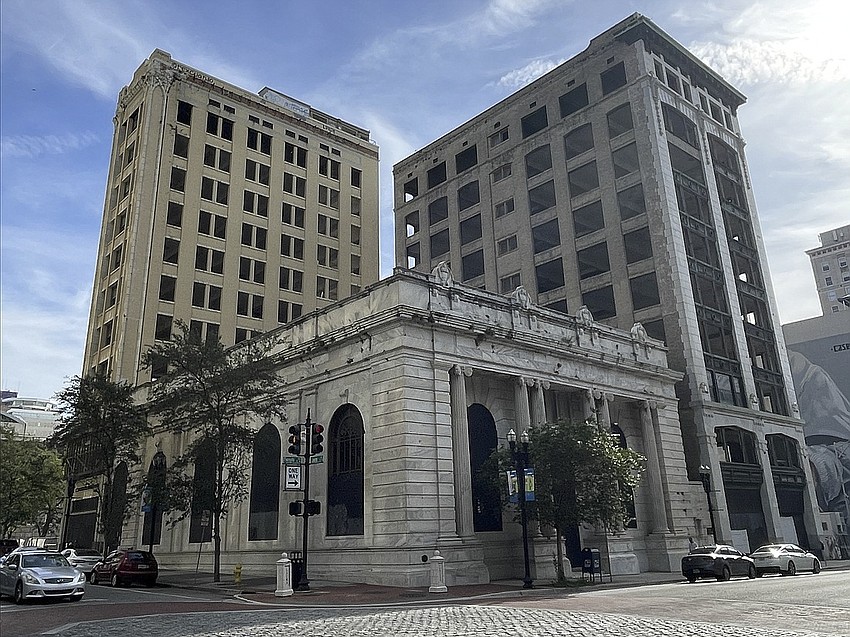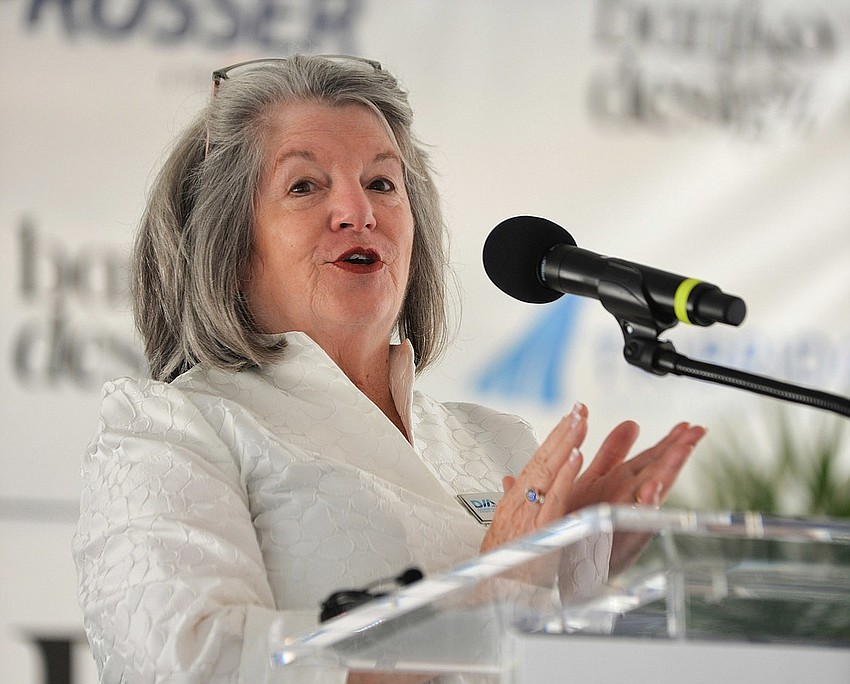
The Jacksonville Downtown Investment Authority board is leaving the decision whether to provide at least $63.56 million in incentives for a private developer’s proposed Laura Street Trio renovation to City Council.
The DIA board voted 5-1 on June 21 on a resolution that sends a term sheet for $36.55 million in city-backed historic forgivable loans and property tax breaks to Council without a recommendation for or against the deal.
SouthEast Development Group proposes a $175.1 million multifamily, hotel and restaurant development plan for the Trio property on Downtown’s Northbank.
The term sheet comprises $16.01 million in historic forgivable and deferred principal loans and a $5.67 million Recapture Enhanced Value Grant property tax refund for the hotel and restaurant, according to the DIA staff report.
The Klutho at Laura Street multifamily portion would receive $6.02 million in forgivable loans and an $8.85 million REV grant.
The project
SouthEast Principal and Trio owner Steve Atkins’ latest pitch would transform the trio into a 143-room, four-star Marriott Autograph Collection Hotel; a restaurant and bar open to hotel patrons and the public; and 169 apartments with market-rate and workforce housing units.
Atkins bought the Trio, built from 1902-1912 at Laura, Forsyth and Adams streets, in 2013. It comprises the Florida National Bank, Bisbee and Florida Life Insurance buildings.

Some board members, including Vice Chair Jim Citrano Jr., were concerned that the city’s overall investment could be too high and Atkins may not be bringing enough of his own equity in the project to secure a construction loan.
Atkins also did not meet the DIA’s Downtown Preservation and Revitalization Program’s threshold for developer equity and will require a waiver by Council.
Board members also were hesitant to support an incentives package that relies on an additional $27 million from Council to meet the DIA program criteria. The original DIA resolution that would have recommended Council approve the historic incentives and REV grant passed a board committee June 15 in a 3-1 vote.
But the concerns raised at that meeting caused CEO Lori Boyer and her staff to draft alternate versions of the resolution.

She said June 21 that if the DIA board had voted down the incentives deal, it would have been more difficult for supportive Council members to convince their colleagues to support the package and could put the project in jeopardy.
The resolution did not give Boyer the directive to file legislation with Council. Instead, she will advise the developer, city Office of General Counsel and a Council member willing to file the bill on how to craft the legislative documents.
Coming in August
After the meeting, Boyer said she expects legislation could be introduced by Council in August.
Boyer said she doesn’t view the DIA’s action as punting the decision to Council but rather a “bunt” to advance the deal.
If approved, the city would be protected because all the incentives would be paid out after the deal is complete.

But Boyer said Council members will have to consider how the Trio incentives could impact other city-funded projects.
“On the other hand, if you are committing (city) resources, committing (city) debt capacity, and there are competing needs for that (funding), then what you’re also looking at is the general fund’s capacity to fund other things that might be more likely to move forward immediately, and weighing the importance of this project against those other needs,” she said.
Citrano was the lone “no” vote June 21.
“This project deserves incentives. I just don’t like the way it’s being processed,” he said.
Board member Oliver Barakat said he doesn’t want to see a $4 million bridge loan on the Trio property that is scheduled to mature later in 2023 default.
Barakat also shared Citrano’s concern about private capital for the project. He added an amendment to the resolution that, if approved by Council, would require Atkins to show proof within 120 days of signing the redevelopment agreement that he has obtained the necessary equity and debt capital to acquire a construction loan to complete the project.
“The consequence of the deal not coming together is the current owner staring at a loan maturing this fall,” Barakat said.
“I don’t like the amount, I don’t like the ROI (city return on investment). However, there is a cost to the city of staring at these empty buildings day, after day, after day,” he said.
Council support
It will be up to Council to decide whether the historic incentives and $27 million completion grant are an appropriate investment of taxpayer money.

Council member Matt Carlucci, who has been calling for a renovation of the Trio since 2003, urged the DIA on June 21 to back the incentives and submitted a written letter of support.
To receive the $27 million city completion grant, Atkins has been working with Carlucci and Council member Michael Boylan to generate support for the added cash funding.
Carlucci called it a “linchpin” development project.
“If this were not passed by the DIA, that would literally send shock waves through the Downtown development community, the historic community and partially with regards to the Downtown Core.”
This is the third time Atkins has brought a version of the Trio renovation project to the city for public investment.
The most recent was a $70.48 million hotel-only renovation proposal that was awarded a $26.67 million incentives deal in September 2021.
When Atkins’ development team added multifamily and new construction to the project in January 2022 in an attempt to make the effort financially viable, it required changes to the development agreement with the city.
The first proposal to come before DIA in 2017 would have provided $9.8 million from the city tied to the renovation of the Trio and the Residences at Barnett, also co-owned and operated by SouthEast.
The Barnett renovations were completed in 2019 but that project was separated from the Trio renovation and SouthEast did not receive the city incentives.